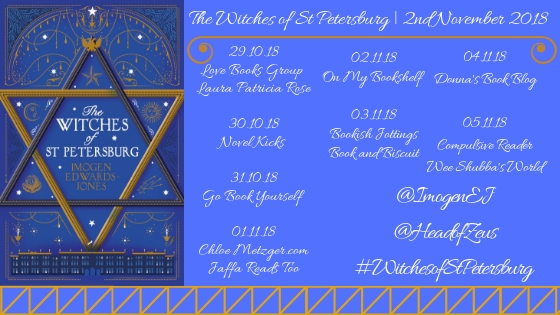The Russian Empire is on the verge of collapse. Revolution is in the air. The starving stalk the streets of St Petersburg and yet the Imperial Court still commute between their estates and organise their lavish balls.
Two sisters arrive in the city. Princesses from Montenegro; they are famed for their wild beauty and mystical powers. Initially ridiculed and outcast as the daughters of a provincial ‘Goat King’, they react in the only way they know how. They befriend the isolated Tsarina Alexandra and, using their gifts, they help her in her increasingly desperate quest to give birth to a son and heir. The circle closes. The girls are the gateway. Gurus, clairvoyants, holy fools and charlatans all try their luck. Then in one last, doomed, throw of the dice, the sisters introduce Rasputin into the Russian Court…
Based on the true story of the lives of the Princesses Militza and Anastasia of Montenegro, The Witches of St Petersburg by Imogen Edwards-Jones is an interesting read for presenting the build up to the Russian Revolution from within the very heart of the Imperial Court. The murder of Nicholas II and the Imperial family during the Russian revolution feels like one of those historical moments that everyone has an awareness of, with much popular culture dwelling on the fate of Anastasia before the discovery of her remains, so a book which hints at the build in tension towards this while focusing on another aspect of the story- the rise of Rasputin- gave me some understanding of the wider historical context and tensions that lead to this point.
The Witches of St Petersburg benefits from being set against the backdrop of an incredible period in Russian history, but in many ways has been constrained by this as well. While I found the characterisation of the novel fascinating, and in particular thought that Imogen Edwards-Jones had captured the brittle stubbornness of the historical Tsarina Alexandra, I also found that there were many occasions during which the narrative seemed to hover somewhere between the historical and fictional worlds without being able to commit fully to either.
At times we were to believe that the sisters are powerful witches, but very often they seemed powerless, or their only power was to empower men to act on their behalf. I didn’t understand their motivations as to why they attempted to “help” the Tsarina conceive a son- surely they would have had more to lose than to gain at many points in the novel. Similarly, I could never decide whether we were to see the character of Maître Phillipe as a genuine mystic or a charlatan and the authors perspective seemed to equivocate between this. Likewise, the author filled Militza with such a revulsion for the character of Rasputin that it was difficult to believe in her desire for him at points in the novel. Was he intended to be a cult figure with no real power beyond charisma, or was he intended to be an occult figure with a genuinely dark power behind him?
I don’t normally give a trigger warning for books, but I did find that this had a fixation on pregnancy loss that was somewhat unnecessary, and if I had read this closer to the loss of our little twin I would have found this very upsetting. The Tsarina’s struggles to conceive a son are relevant to the story, and historically accurate, but the book dwelled on Militza’s loss of a twin at birth in a way that seemed very much at odds with the scant reference to her surviving children throughout the book. The most upsetting part for me though was the graphic description of a miscarriage of twins in the early stages of the novel which the author has clearly intended to be horrific (and she succeeds in this) in order to give the sisters the physical material to pay the “price” of creating Rasputin later in the novel. I understand why the author has done this, but the sisters also make reference to there being a price for saving the life of The Grand Duchess Maria Pavlovna after she lost the twins, and it is unclear what this is, the two prices seem to be separate.
The issue of the way in which the depictions of pregnancy loss were handled aside, I do think that this is an interesting novel for gaining a feel for the atmosphere of the Russian Imperial Court. However, if you are a purist in terms of historical novels, you may well find that the conflict between source material is too much for you.
Other readers may well feel differently about the book to me, so check out the rest of the Witches of St. Petersburg book tour to see what others thought. Thanks to Midas PR and Head of Zeus who sent me a review copy of the book in exchange for my honest opinion.

